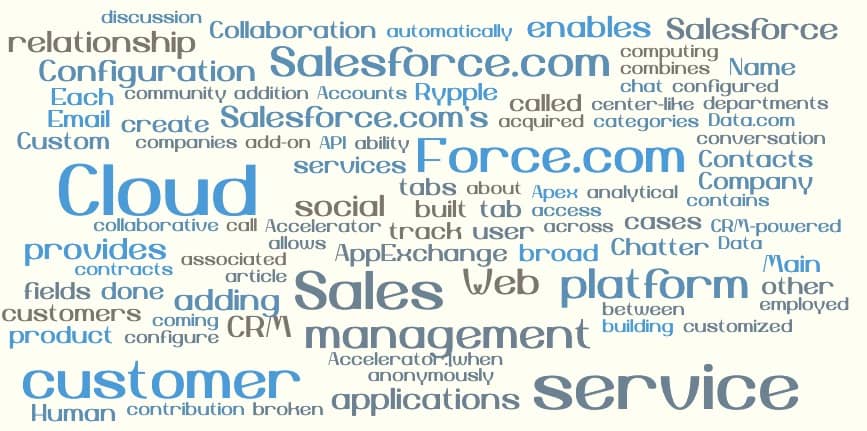- Apex: Salesforce’s proprietary, object-oriented programming language for developers.
- API (Application Programming Interface): A set of rules that allow programs to talk to each other. Salesforce offers several APIs, such as the Bulk API, REST API, and SOAP API.
- AppExchange: Salesforce’s online marketplace for third-party apps built on the Salesforce platform.
- Batch Apex: A way of handling large data sets by breaking them down into smaller batches, executing the operation, and repeating the process until all data is processed.
- Campaign: A marketing project that you want to plan, manage, and track within Salesforce.
- Chatter: Salesforce’s collaboration tool that allows users to talk to each other, share information, and collaborate on projects.
- Community Cloud: A social platform from Salesforce.com, created for businesses to connect employees, partners and customers.
- CPQ (Configure, Price, Quote): A Salesforce product that automates the generation of sales quotes.
- CRM (Customer Relationship Management): A system that helps manage a company’s interactions and relationships with both current and potential customers.
- DML (Data Manipulation Language): In Salesforce, it refers to Apex methods that perform operations on records.
- Einstein Analytics: A product that provides advanced analytics capabilities, including AI and predictive modeling.
- Force.com: The platform on which Salesforce apps are built.
- Governor Limits: Salesforce’s way of ensuring that system resources are used efficiently by limiting the operations that can be performed in a single transaction.
- Lightning Experience: The modern and intuitive user interface for Salesforce.
- Managed Package: A collection of Salesforce components that are posted on the AppExchange as a unit.
- Objects: These are tables in the Salesforce database that store a particular kind of information.
- Org: Short for “organization”, it refers to a specific instance of Salesforce.
- Platform Events: A type of event that you define in Salesforce. Other apps can publish and subscribe to these events.
- Process Builder: A visual tool for automating business processes in Salesforce.
- Profiles and Permissions: These control what users can do and see in Salesforce.
- SOQL (Salesforce Object Query Language): A language that allows you to construct powerful query strings in Apex statements, in Visualforce controllers and getter methods, etc.
- SOSL (Salesforce Object Search Language): A Salesforce search language that gives you the ability to perform text searches in Salesforce.
- Sandbox: A test environment for Salesforce.
- Schema Builder: A tool that allows you to visualize and edit your data model.
- Service Cloud: Salesforce’s customer service platform that helps companies manage support and service.
- Trigger: Code that is executed before or after a record is updated or inserted.
- Visualforce: A framework that allows developers to build sophisticated custom user interfaces that can be hosted on the Salesforce platform.
- Workflow Rule: A business rule that you define for Salesforce to automate standard internal procedures and processes.
This list should cover most of the terminology and acronyms related to Salesforce development and administration. However, Salesforce is a vast ecosystem with many niche areas, so there may still be specific terms not covered here.
Salesforce custom development versus Salesforce AppExchange
Salesforce Einstein Activity Capture: A Guide for Admins and Developers
